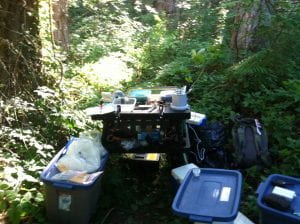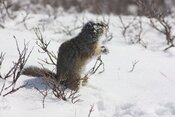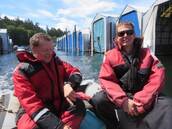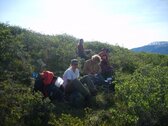Research
Understanding how ecological stressors drive changes in animal physiology and behavior and how this affects individual fitness, population dynamics, and ecosystem processes is a central theme in the lab. A major portion of our work also address the transgenerational impact stressors experienced by mothers have on their offspring.
Current Projects
- The influence of predation risk on the cognition and neurophysiology of free-living white-footed mice. This project examine both how predation risk may infleunce the spatial working memory and gene expression in the brains of free-living mice, but also how individual working memory may help animal cope with acute exposure to risk. It also will explore potential mechanisms of PTSD. (Leah McKay, Master’s student).
- The relationship between the microbiome and risk-induced trait changes. This project will identify the specific players in the microbiome that are associated with high and low responding individuals. It will further develop a community of microbes and test whether we can alter individual responses. It has ties to human anxiety and depression, decision-making, and performance. (Miles Valchar, Master’s student).
- The interactive consequences of climate-induced vegetation and human
 disturbance on free-living impala in the Serengeti Ecosystem. This study examines how changes in vegetation, drought, and human disturbance influence the spatial pattern, stress, and nutritional status of impala using GC and thyroid hormones in conjunction with remote sensing data. (Louis Hunninck, PhD student).
disturbance on free-living impala in the Serengeti Ecosystem. This study examines how changes in vegetation, drought, and human disturbance influence the spatial pattern, stress, and nutritional status of impala using GC and thyroid hormones in conjunction with remote sensing data. (Louis Hunninck, PhD student). - Understanding the physiological health of southern mountainCaribou. This project examines the stress and thyroid hormones of southern mountain caribou in BC. There are a large number of distinct herds that are under different management strategies, including predator management. This project seeks to examine if the physiological health of a herd is related to their management strategy and population dynamics. (Currently looking for a PhD student; in collaboration with Rob Serrouya, Anna Calvert, and Helen Schwantje).
- The role of stress hormones in driving population cycles: a comparison of historic and current populations. This project leverages existing historic population data and museum specimens of brown lemmings (Lemmus trimucronatus) combined with current mark-recapture estimates and sampling in Utqiagvik Alaska to compare historic stress hormone levels with current ones. It also evaluates historic and current environmental changes to determine mechanistic drivers of stress hormones across the population cycle. Lastly, it will link the reproductive output (number of babies) to individual stress hormone levels. (Jess Steketee, PhD student; in collaboration with Rebecca Rowe UNH).
Past Projects
- The ‘landscape of fear’ between pumas, vicuñas and Andean condors; and how does individual physiological condition alter foraging trade-off decision making? San Guillermo National Park, Argentina (in collaboration with Arthur Middleton, Emiliano Donadio & Jon Pauli)
- The adaptive potential of maternal stress effects in a free-living vertebrate, the eastern fence lizard. This project examined how predator-induced maternal stress altered offspring morphology, physiology and behavior, and ultimately their survival in the wild in a context dependent manner. Solon Dixon Forestry Center, Andalusia, Alabama. (David Ensminger PhD, Dustin Owen PhD, Kirsty Macleod postdoc; in collaboration with Tracy Langkilde)
- The behavioral and neurophysiological impact of predation risk in free-living deer mice. Portland Island, BC, Canada (in collaboration with Michael Clinchy and Liana Zanette)
- Climate-induced changes in seasonality impact the stress physiology of free-living arctic ground squirrels, and linking these changes to differences in reproductive success, behavior and population density (in collaboration with Brian Barnes, Loren Buck and Rudy Boonstra).
- The population status of arctic ground squirrels at a landscape level and better understand potential ecological causes resulting in failed recolonization of squirrel populations. Kluane Lake Research Station, Yukon, Canada. (Jeff Werner PhD; in collaboration with Charles Krebs)
- Predator-induced maternal stress effects in free-ranging snowshoe hares. We found that maternal stress is a major factor in the 10-year population cycle, contributing to the decline and low phase of the cycle (PhD Thesis of MJS, supervised by Drs. Charles Krebs and Rudy Boonstra)




